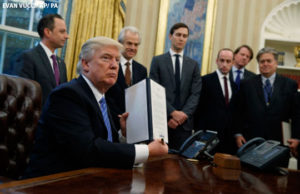
Since Ronald Reagan, banning and un-banning the use of US aid to support agencies that discuss or refer patients for abortion services has been a partisan tradition. Republican presidents make a point of ordering the ban in their first days in office, and Democrats make a point of rescinding it. Donald Trump, in this as in many other ways, is an ordinary Republican. On his third day in office, he signed his new version of the executive order [1].
The order is known as the “Mexico city policy” after its first enunciation in 1984 in Mexico City, or the “global gag rule,” because it effectively blocks US support to any organization that even discusses abortion as a form of family planning (US support for organizations that provide abortion has been illegal by statute since 1973). Trump reinstated the policy as it stood under George W Bush, but added a new and alarming expansion of his own. The policy is now expanded to “global health assistance furnished by all departments and agencies.”
In other words, it does not just affect the roughly $600m spent by the United States Agency for International Development (USAID) on family planning, but affects the $6bn spent by all US agencies, from the Centers for Disease Control and Prevention (CDC) to the National Institutes of Health, and from the Food and Drug Administration (FDA) to the various agencies of the United Nations. This expansion also means that it affects not just the approximately 40 countries that receive US family planning aid, but approximately another 60, which receive assistance from any of these programs. The administrative burden of implementing this rule, on both US agencies and aid recipients, could be very large. It is also hard to see how the US can effectively address a problem such as the Zika virus under such rules.
The consequences of this action can be expected to be widespread and contrary to the stated intent of the rule. If the goal of this policy is to reduce the number of abortions worldwide, then it will fail. Countries exposed to the gag rule show an increase in their abortion rates during the times when the rule is in effect, and a reduction when it is not [2].
Policies that curtail investments into comprehensive family planning programming result in reduced contraceptive prevalence rates and reduce the outreach of these programs to the rural areas where the majority of people in sub-Saharan Africa live.
Furthermore, this policy increases the number of abortions by reducing the ability of family planning programs to reach women with modern contraception and therefore prevent unwanted pregnancies. Women, when faced with an unwanted pregnancy, will often turn to abortion [2]. Reducing access to abortion and contraception results in shorter birth intervals, which negatively impacts the health of women and their children and results in higher levels of child malnutrition [3]. Instead of reducing abortion rates, or improving the health of women and children in the world’s poorest countries, the global gag order increases the number of abortions, as well as maternal and child morbidity and mortality.
American advocates of public health and reproductive rights clearly have a lot of work to do, including intervening in the detailed process of working out the implications of this order for agencies such as the CDC or FDA. The impact this order will have on birth control and other policies, including the administrative costs, is still to be determined and can still be affected by political and administrative action.
Trump’s action gives European and other governments a clear opportunity to show global leadership by making up for the US’s policy. The Netherlands has already proposed a fund to make up the $600 million that Trump’s action will cost the global family planning sector, and more than 20 governments are reportedly interested in contributing. [4]
Advocates of public health and gender equality outside the US have more to do, though. They must hold their governments to their promises. The history of foreign aid is one of governments failing to meet their general aid targets, or even fulfilling specific, popular commitments, unless they are put under serious political pressure. Making sure governments make and fulfill their commitments will be crucial.
Furthermore, replacing $600m only compensates for George W Bush’s version of the order, not Trump’s. Other governments and donors, if they are to truly compensate for what Trump has done, will have to expend both thought and money on ways to compensate for the scale of Trump’s expansion of the order.
Scott L Greer is associate professor of global health in the Department of Health Management and Policy, University of Michigan School of Public Health. A political scientist, his research and writing focuses on the politics and policies of the European Union and United States.
Competing interests: Scott L Greer has read and understood BMJ policy on conflict of interests and declares the following interests: none.
Sarah D Rominski is a research assistant professor in the Department of Obstetrics and Gynecology, University of Michigan Medical School. She has worked extensively on the topic of contraception and family planning, including access to safe abortion services in sub-Saharan Africa, specifically Ghana and Ethiopia.
Competing interests: Sarah D Rominski has read and understood BMJ policy on conflict of interests and declares the following interests: none.
[1] Presidential Memorandum Regarding the Mexico City Policy 23 January 2017. https://www.whitehouse.gov/the-press-office/2017/01/23/presidential-memorandum-regarding-mexico-city-policy
[2] Bendavid E, Avilab P, Miller G. United States aid policy and induced abortion in sub-Saharan Africa. Bull World Health Organ 2011;89:873–880C. doi:10.2471/BLT.11.091660 http://www.who.int/bulletin/volumes/89/12/11-091660/en/
[3] Jones KM. Evaluating the Mexico City Policy: How US Foreign Policy Affects Fertility Outcomes and Child Health in Ghana. IFPRI Discussion Paper 01147 December 2011 http://www.ifpri.org/publication/evaluating-mexico-city-policy
[4] The Netherlands and Belgium are opposing Trump by offering to fund abortions abroad. Rick Noack. Washington Post 25 January 2017 https://www.washingtonpost.com/news/worldviews/wp/2017/01/25/opposing-trump-netherlands-wants-to-help-fund-abortions-abroad/
